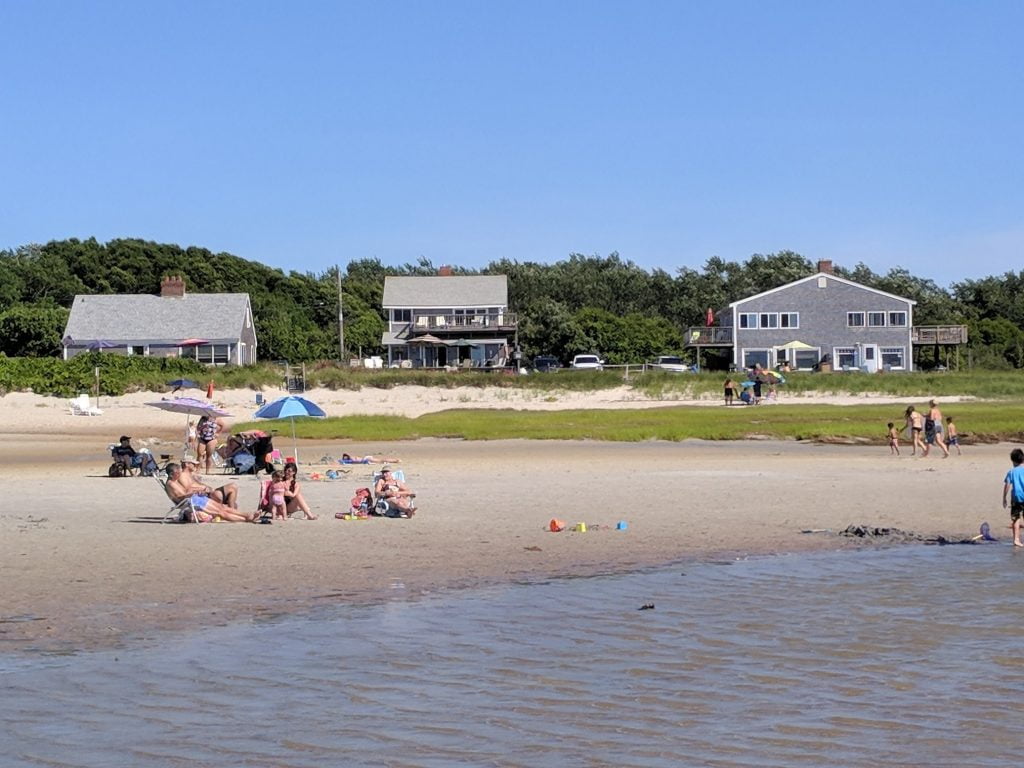
Whenever I heard the phrase “grandfathered in,” this photo was always what I imagined: the upstairs unit of the middle Cape Cod beach cottage that was my family’s rented little slice of heaven for two weeks every summer. I thought it just meant situations where the rules had changed but things that had been approved under the old rules could still stay, like, “You couldn’t put a house that close to the beach now because of environmental regulations, but this was built way back in the days of our grandfathers, so it’s OK.” It made me smile with the association to our beloved getaway and my own beloved grandfathers. Just a charming little metaphorical shortcut, right?
NOPE. It’s not. Yup, it means what I thought, but only by extension from a very specific historical reference. Over to you, Wikipedia: “The term originated in late nineteenth-century legislation and constitutional amendments passed by a number of U.S. Southern states, which created new requirements… to register to vote. States in some cases exempted those whose ancestors (grandfathers) had the right to vote before the Civil War, or as of a particular date, from such requirements. The intent and effect of such rules was to prevent poor and illiterate African-American former slaves and their descendants from voting, but without denying poor and illiterate whites the right to vote. Although these original grandfather clauses were eventually ruled unconstitutional, the terms grandfather clause and grandfather have been adapted to other uses.”
And once I learned that? HELL YES, I decided to stop using this handy little phrase. Because HELL NO, I do not want anything that surreptitiously borrows from that history coming out of my mouth accidentally. I don’t want to use it as a metaphor for anything else unless I’m doing it deliberately and meaningfully to shine a light on other hidden injustices. I cannot possibly feel casual about touching that history anymore. I personally recoil from the truth of how this seemingly innocent idiom entered our language. I will not strip that meaning away from it and use it as though it had no history and context — at least until that truth is widely understood and acknowledged in our country.
Nobody told me it was off limits and I had to stop using it. Nobody except me.
I learned something, and so I changed.
Same thing with Halloween costumes. You guys, I’m sorry to say, somewhere there is a picture of me, maybe 15-20 years ago, dressed for office trick-or-treating in a lovely cotton Japanese kimono that was a gift from a Tokyo-based couple at my husband’s company. They presented it to me earlier that year, showed me how to arrange it, taught me to tie the special bow for the sash. It was so generous of them to include me in their beautiful cultural tradition.
Did that mean I had universal permission to wear it as a costume, along with a clumsy attempt at doing my hair and makeup in some vague nod to a “geisha” look? I have since learned, NO IT DID NOT.
At that time, I didn’t yet know (although I could have and should have) that wearing someone else’s culture as a costume is part of a long and dishonorable tradition of white people giving ourselves freedom to “play” with things that have actually been severely punished BY WHITE PEOPLE when used by the actual members of that culture. Heyyyyy, I’m looking at you, U.S. government incarceration of tens of thousands of American citizens and legal residents of Japanese descent during the lifetime of my own parents not so long ago, when observing cultural traditions was cited as one of the reasons “those people” were “not really American.”
I wouldn’t do that again. Not because I’d “get in trouble” for it. Because I personally feel disgusted by the big picture of hypocritical and cruel behavior like this over centuries, now that I’m starting to be more aware of it. Because I choose, for my own integrity, not to be someone who continues that behavior.
Because I learned, so I changed.
I used to not know that 1+1=2. I learned, so now I wouldn’t go around saying it’s 3.
I used to think that “ennui” was pronounced “ENN yoo aye.” I learned, so now I pronounce it “ahn WEE.”
What is the point of learning, if not to change? There are so many things where we learn and we don’t just keep insisting on our right to behave as if we hadn’t learned anything.
Yep, sure, my intentions were good when I did these things. I never meant to offend anyone by saying “grandfathered.” I never meant to offend anyone by wearing that kimono. Did I even actually hurt anyone directly? Honestly, I’m not sure if anyone who witnessed me using that phrase or that costume felt offended.
Does that matter?
Not to me.
That’s not the point. The point is not whether I got called out, or even whether someone around me quietly felt bad — although if you did and you’re reading this, I’m so sorry.
The point is, I thought it was a treat: just a cute saying, just a fun outfit. Now I know it was a trick: our terrible hidden history masquerading as something meaningless.
The point is, now that I know more about that history, it hurts my heart to see how it’s still haunting us here today, unacknowledged and unrepaired.
The point is, I can acknowledge it even if I can’t repair it. I can choose to stop being part of it.
I can learn, and change.